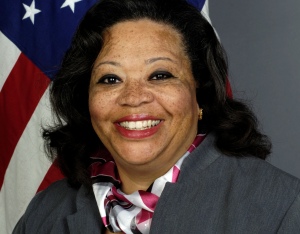US ambassador urges S. Sudan to close gender gap
March 30, 2013 (JUBA) – Strengthening women’s voices in government and their engagement in decision-making processes is key to building a more stable and democratic South Sudan, the American ambassador to the country says.

The annual declared month is celebrated worldwide as a way of highlighting the contributions of women to events in history and contemporary society.
Twenty leading female figures, including representatives from politics, civil society and business, were among the guest list at the event, described by Page as an “informal woman-to-woman discussion”.
She said the US embassy was keen to learn more about the specific issues affecting South Sudanese women, as well as ways it could better support their struggle to gain equal rights.
Among those attending were former minister Mary Kiden Kimbo, deputy speaker of Western Equatoria state Hannah Lona, director of Ivory Bank Bruna Iro, Paleki Obur of the South Sudan Women’s Empowerment Network, veteran broadcaster Veronica Lucy Gordon, deputy chair of the Southern Sudan Women Lawyers’ Association Julia Akur, successful businesswoman Rose Pita Juma and Zahra Said of the Sudanese Network for Democratic Election (SuNDE).
Addressing participants at the gathering, Page said they had been selected to attend not only for their professional expertise, but also for their collective experiences as mothers, daughters, aunts and sisters.
The ambassador called on the women to share their stories and work together in order “to build the solidarity necessary to women becoming a more vocal, integral part of South Sudan’s continuing democratic transformation.”
“I hope that all of us will use this opportunity to share our stories, our challenges and our successes as women in the office, in the classroom and in our families, and explore, through fruitful discussion, the things that we can do as individuals and as a collective to elevate South Sudan to the next level socially, economically and politically”, Page said in her address.
Citing the examples of Bosnia and Ireland, Page said South Sudanese women also had a leading role to play in grassroots conflict resolution and peace-building.
The ambassador said the main reason women made such powerful peacemakers was because, regardless of their tribal or ethnic background, all women shared the same aspirations for their children; that they may be permitted to grow up in a safe, secure environment, with access to adequate education and healthcare.
She urged participants to continue to agitate for wider change and equal opportunities in their own country.
“Change does not always happen quickly. However, the more you are able to come together in solidarity, to prioritise women’s needs and to speak with one voice to improve opportunities for all women and girls, the more likely you are to affect change,” she said in her speech.
Page also stressed the importance of involving men in discussions and strategies on gender equality, saying they also had a role to play in improving women’s access to business, education and politics.
Domestic violence, rape, sexual harassment and teen marriage remain at alarmingly high levels in South Sudan.
Rights campaigners say gender-based violence has profound implications for women’s health and empowerment, and remains one of the major contributing obstacles to the country’s development.
(ST)
.
